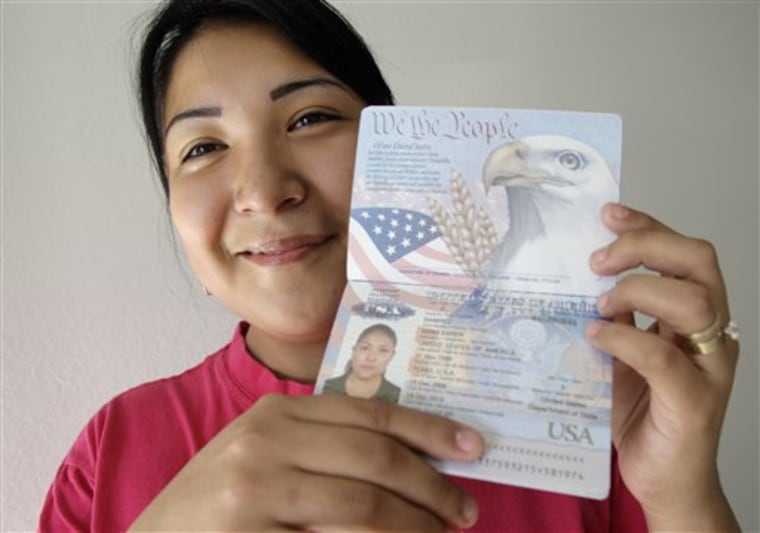The citizenship of hundreds, possibly thousands, of people who insist they are Americans is being called into question because they were delivered by midwives near the U.S.-Mexico border.
The federal government's doubts have arisen as many people in the border region try to meet a June 1 deadline to obtain U.S. passports so they can freely cross from one country to the other.
The people delivered by midwives have documents such as birth certificates and medical records. But the agency that grants passports is challenging the credibility of those papers, citing a history of some midwives fraudulently registering Mexican-born babies as American.
The passport applications being questioned include those of children of Mexican women who crossed the border to give birth in the United States, and even employees of the U.S. Customs and Border Protection agency who were born on the border and now work to protect it.
The government has "effectively reduced to second-class citizenship status an entire swath of passport applicants based solely on their being of Mexican or Latino descent and having been delivered by midwives in nonhospital settings in Southwestern border states," according to a federal lawsuit against the State Department filed last year in McAllen.
Immigration attorneys and the ACLU hope to have the case certified as a class action because they believe thousands of people could be affected, with most still living near the border.
75 midwives convicted since 1960
Since 1960, 75 Texas midwives have been convicted of fraudulently registering Mexican-born babies as American. At one point, the government assembled a list of nearly 250 "suspicious" midwives but never explained what made them suspicious.
State Department spokesman Andy Laine declined to comment because of the litigation. The agency also declined to release statistics on passport application refusals.
After June 1, anyone re-entering the United States from Mexico or Canada will have to show a passport, not just a driver's license and birth certificate, which are the only current requirements.
For families who have lived in the area for generations, the border is just a river in the middle of one community. Many people live on one side of the border and work on the other.
"Going back and forth is as natural for them ... as going across town is for the rest of us," said immigration attorney Lisa Graybill.
If the lawsuit is not resolved before June 1, families "will have to choose if you're going to live in Mexico or you're going to live in the U.S. You won't be able to cross," said Lisa Brodyaga, another immigration attorney.
Anna Karen Ramirez had to sue the State Department to get her passport, even though she had a birth certificate, medical records and receipts from her birth in 1989 at a Hidalgo, Texas clinic, as well as the signatures of two police officers who witnessed the event.
Lived in Mexico, had child in U.S.
Ramirez's parents lived in Mexico and raised their daughter there. But they decided to have their child in the United States.
With the deadline looming, and the State Department suspicious of her citizenship, the family met several times with U.S. consular officials to obtain a passport, but their request was refused.
Ramirez's father, Narciso, drives a taxi back and forth across the border every day. He said he was warned that the family's dogged pursuit of the matter could threaten the visa that allowed him to operate his cab.
Anna Ramirez sued, and while waiting, voted unchallenged in the U.S. presidential election. A month later, she received her passport but never got a clear statement of citizenship.
"Every 10 years she's going to have to prove she's a U.S. citizen" to renew her passport, said her attorney, Naomi Jiyoung Bang.
The State Department practices are "a holdover from an older, less-regulated world," said Mark Krikorian, executive director of the Center for Immigration Studies, which advocates for more restrictive immigration laws. "It's what happens when modern standards collide with old country practices."
Kirkorian said the government cannot just believe everyone, nor can it turn down everyone delivered by a midwife.
Finding evidence
Because Ramirez is young, her parents were able to find documents the government requested. The midwife who delivered her was still alive and able to testify. They could also afford to hire an attorney to help.
David Hernandez had a harder time locating evidence.
He was born in San Benito, Texas, in 1964, to a Mexican mother who was visiting friends when she went into labor. Hernandez was delivered by a midwife who appeared on the suspicious midwife list, though without a conviction. He returned to Mexico with his mother.
The two moved back to the U.S. a few years later. He attended schools in Texas and served in the Army.
In response to government requests, he collected mounds of documentation including papers from his military service, immunization and baptismal records, and witness affidavits. When he requested his school records, he was told that his elementary school papers no longer existed.
In April 2008, the government refused his passport application.
"I was born here," he said last fall when the ACLU took on the case. "I've lived and worked here and served in the Army. I feel betrayed, like my country is stabbing me in the back just because my mother didn't have the luxury of having me in a hospital."
